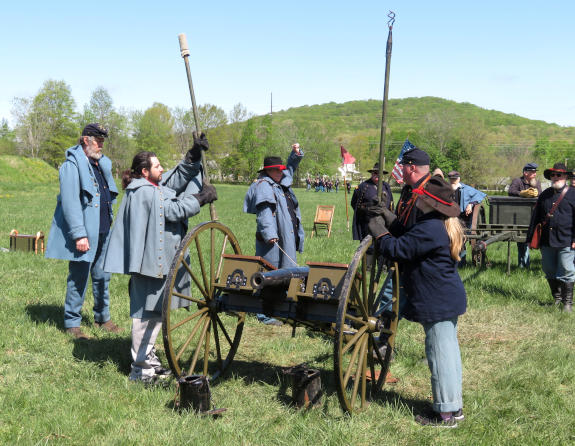NEWS OF 150 YEARS AGO
May and June 1864
From The Missouri Democrat, Monday, May 16, 1864.
A THRILLING NARRATIVE.
Miss Major Pauline Cushman, the Federal Scout and Spy.
[From the Detroit Tribune, May 24]
Among the women of America who have made themselves famous since the opening of the rebellion, few have suffered more or rendered more service to the Federal cause than Miss Major Pauline Cushman, the female scout and spy. At the commencement of hostilities she resided in Cleveland, Ohio, and was quite well known as a clever actress.
From Cleveland she went to Louisville, where she had an engagement in Wood’s Theatre. Here, by her intimacy with certain rebel officers, she incurred the suspicion of being a rebel, and was arrested by the Federal authorities. She indignantly denied that she was a rebel, although born at the South, and having a brother in a rebel Mississippi regiment.
In order to test the love for the old flag, she was asked if she would enter the secret service of the Government. She readily consented, and was at once employed to carry letters between Louisville and Nashville. She was subsequently employed by General Rosecrans, and was for many months with the Army of the Cumberland. She visited the rebel lines time after time, and was thoroughly acquainted with all the country and roads in Tennessee, Northern Georgia, Alabama and Mississippi, in which sections she rendered our armies invaluable service. She was twice suspected of being a spy, and taken prisoner, but managed to escape.
At last, however, she was not so fortunate. After our forces had captured Nashville, Major Cushman made a scout toward Shelbyville to obtain information of the strength and position of the enemy, and, while returning to Nashville, was captured on the Hardin pike, eleven miles from the latter city. She was placed on a horse, and, in charge of two scouts, was being taken to Spring Hill, the headquarters of Forrest.
While on the way to this place, she feigned sickness, and said she could not travel any further without falling from her horse. Her captors stopped at a house on the roadside, when it was ascertained that a Federal scouting party had passed the place an hour before. Knowing that her guards had important papers for General Bragg, the quick-witted spy seized the fact and schemed to use it to her advantage.
Seeing an old negro who appeared to commiserate for unfortunate plight, she watched her opportunity and placed $10 in Tennessee money in his hand, saying, “Run up the road, Uncle, and come back in a few minutes, telling us that four hundred Federals are coming down the street.” The faithful negro obeyed the order literally, and soon came back in the greatest excitement, telling the story. The two “rebs” told him he lied. The old colored man got down on his knees, saying, “Massa, dey’s cumin’, sure nuff; de Lord help us, dey is cumin’.”
The scouts at this believed his story, mounted their horses, and “skedaddled,” for the woods. Miss Cushman, seizing a pistol belonging to a wounded soldier in the house, also mounted her horse and fled towards Franklin. She traveled through the rain, and, after nightfall, lost her way. Soon came the challenge of a picket, “Who comes there?” Thinking she had reached the rebel line, she said: “A friend of Jeff. Davis.” “All right,” was the reply, “advance and give the countersign.”
She presented the countersign in the shape of a canteen of whiskey. She passed five pickets in this way, but the sixth and last was obdurate. She pleaded that she was going to see a sick uncle at Franklin, but the sentry couldn’t see it. Sick and disheartened, she turned back. Seeing a light and a farmhouse, she sought shelter. An old man received her kindly, showed her to a room, and said he would awake her at an early hour in the morning, and show her the road to Franklin.
A loud knock awoke her in the morning from her Lethean slumbers, and upon arousing she found her horse saddled and the two guards from whom she had escaped the previous afternoon. She was taken to the headquarters of Forrest, and he sent her, after a critical examination, to General Bragg. Nothing could be found against her until a secesh woman stole her gaiters, under the inner sole of which were found important documents which clearly proved her to be a spy.
She was tried and condemned to be executed as a spy, but being sick, her execution was postponed. She finally, after lying in prison three months, sent for General Bragg, and asked him if he had no mercy. She received from him the comforting assurance that he should make an example of her, and that he should hang her as soon as she got well enough to be hung decently.
While in the state of suspense, the grand army of Rosecrans commenced its forward movement, and one fine day the rebel town where she was imprisoned was surprised and captured, and the heroine of this tale was, to her great joy, released. She is now in this city visiting friends having arrived at the Biddle House one day last week.



